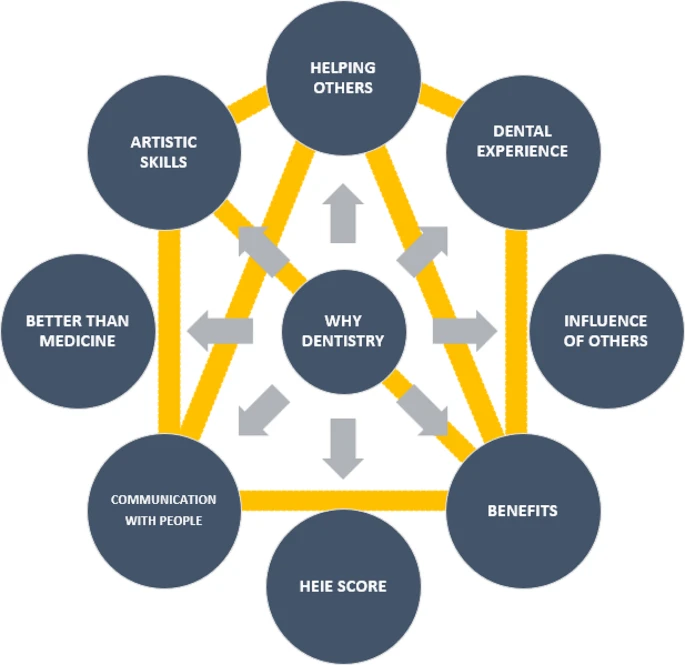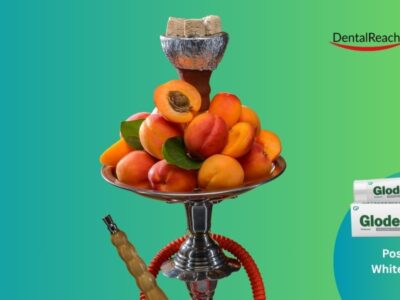In the complex web of society’s beliefs and individual expectations, people face a lot of dilemmas when choosing their careers. The distinction between good and bad shapes the aspirations of individuals driving them to seek careers that not only fulfill personal needs but also contribute to the betterment of society. This article considers all these factors in detail while elucidating the multifaceted nature of dentistry as a career choice and its implications for education and practice.
Why does one choose dentistry?
Choosing to become a dentist, a job respected for its mix of science, creativity, and service to humanity is also led by a variety of other factors including moral beliefs, capitalist ideologies, and sociocultural norms that shape the trajectory of aspiring dental professionals.
Individuals may embark on a dental career driven solely by material aspirations, aiming to accumulate wealth without a broader sense of social responsibility. Conversely, social values may inspire individuals to embrace dentistry as a means of serving others and contributing to community well-being rather than gaining capital.
John Holland’s theory of career choice posits that individuals gravitate towards professions that align with their personality traits and preferences. The dental profession, renowned for its blend of scientific rigor and interpersonal skills, attracts individuals who thrive in environments conducive to collaboration and service.
In 2021, researchers at the Faculty of Dentistry, Bursa Uludağ University, Türkiye, conducted a study to delve into the motivations driving first-year dental students in Türkiye to pursue dentistry. (1)Approved by the Social Sciences and Humanities Research and Publication Ethics Committee of Bursa Uludağ University, the study employed a quantitative correlational cross-sectional survey design, gathering data through questionnaires and employing both descriptive and inferential methods for analysis. Many similar surveys have been conducted in various places in Europe, Australia, UK, Nigeria, Tanzania etc. (2-6)
The finalized questionnaire comprised three sections at least: sociodemographic profile, motivators for choosing dentistry as a career, and satisfaction with dentistry as a career. The questionnaire included a mix of open-ended and closed-ended questions, allowing for comprehensive insights into the participants’ motivations and satisfaction levels. The studies usually targeted first-year dental students ensuring voluntary participation. Participants who left survey questions blank or exited the survey midway were excluded from the analysis.
The correlational framework between the motivational factors in dental students
 Factors Influencing Career Choice
Factors Influencing Career Choice
1. Helping others
Helping others encompasses various dimensions within the context of dentistry. Firstly, it entails addressing the oral health needs of patients, alleviating their pain, and restoring their dental function and aesthetics. Dental professionals play a crucial role in diagnosing and treating dental diseases, preventing oral health problems, and promoting oral hygiene practices. By providing essential dental care services, they contribute to enhancing patients’ quality of life and fostering overall health outcomes.
Dental professionals often engage in community-based programs, outreach clinics, and educational campaigns aimed at raising awareness about oral health issues and promoting preventive care practices. By reaching out to underserved populations, marginalized communities, and vulnerable individuals, they strive to bridge gaps in access to dental services and address disparities in oral health outcomes.
2. Influence of Family and Friends
Family plays a pivotal role as a primary source of influence on dental students’ career choices. For many students, familial expectations, values, and traditions may heavily weigh into their decision to pursue dentistry as a profession. Parents, siblings, or other family members who are dentists or healthcare professionals can serve as role models and sources of inspiration, offering firsthand insights into the rewards and challenges of a dental career. Their encouragement, support, and guidance may influence students’ perceptions of dentistry and reinforce their interest in the field.
The influence of peers and social networks can significantly impact dental students’ career decisions. Interactions with classmates, friends, and professional networks provide opportunities for information-sharing, peer support, and social validation of career choices.
Mentors and role models also play a crucial role in shaping dental students’ career trajectories. Experienced dental professionals, faculty members, and practicing dentists who serve as mentors can offer invaluable guidance, mentorship, and career advice to students.
3. HEIE Score
The Higher Education Institutions Examination (HEIE) score is a significant motivational factor influencing the career choices of dental students, particularly in countries like Türkiye where admission to dental schools is highly competitive and based on standardized entrance exams.
Students invest significant time, effort, and resources into preparing for the exam, often undergoing rigorous academic training, attending preparatory courses, and engaging in intensive study sessions to maximize their chances of achieving a high score.A high HEIE score can open doors to a wide range of educational and professional opportunities, enabling students to pursue their passion for dentistry and fulfill their career goals within the field.
However, the emphasis on the HEIE score as a motivational factor in dental students’ career choices also highlights the inherent challenges and pressures associated with standardized testing and academic performance. The intense competition for limited spots in dental schools can create stress, anxiety, and psychological burdens for students, leading to burnout, self-doubt, and mental health issues.
4. The Feminization and Sociocultural Dynamics of Dentistry:
In recent decades, the dental profession has witnessed a significant demographic shift with the increasing participation of women. Across industrialized nations, more than half of active dentists are women, reflecting changing societal norms and perceptions of gender roles. This trend is mirrored in the growing proportion of female dental students, who perceive dentistry as a profession conducive to their abilities and aspirations.
5. Better than Medicine
One reason students may perceive dentistry as “better than medicine” is the potential for a more favorable work-life balance. Dentists often have more control over their schedules compared to medical doctors, allowing for greater flexibility in managing patient appointments and personal time. This flexibility can be appealing to individuals who prioritize a balanced lifestyle.
While financial motivations are not the sole driving force behind choosing dentistry, some students may be attracted to the potential for a stable income and financial security in the dental profession. Dentistry typically offers competitive earning potential, especially for practitioners who establish successful private practices or specialize in lucrative areas such as cosmetic dentistry or implantology.
6. Possessing Artistic Skills
Some individuals are drawn to the creative and aesthetic aspects of dentistry, which involve sculpting and shaping dental materials to achieve functional and visually pleasing outcomes. The intersection of artistry and science in dentistry appeals to students who possess a passion for both disciplines and seek a profession that allows them to express their creativity while providing essential healthcare services.
These findings suggest that there may be variations in motivation among students pursuing different health programs. Furthermore, this analysis revealed that the well-being motivator of “helping others” exhibited a positive correlation of more than 0.65 with factors such as “communicating with other people,” “artistic skills,” and “benefits.”
This suggests that individuals with strong inclinations toward helping others may also possess strong communication and artistic skills, which can contribute to their success in the field of dentistry.
Conclusion
By identifying and understanding the above mentioned motivators, educators and policymakers can develop more targeted strategies for recruitment, training, and retention of dental professionals. Moreover, recognizing the interplay between moral beliefs, capitalist ideologies, and personal aspirations can foster a more nuanced approach to career guidance and mentorship within the dental profession.
References
- Effect of morality or capitalist ideology in choosing dentistry as a career in Türkiye: a cross-sectional study: https://bmcmededuc.biomedcentral.com/articles/10.1186/s12909-024-05275-8
- Haslach SD, Aytepe Z, Kokkari A, Azrak B, Ehlers V, Herz MM, et al. Country and gender differences in the motivation of dental students-An international comparison. Eur J Dent Educ. 2018;22:e724–9.
- Mariño R, Stuart G, Morgan M, Winning T, Thompson M. Cultural consistency in Australian dental students from different ethnic backgrounds. J Dent Educ. 2004;68:1178–84.
- Orenuga OO, da Costa O. Characteristics and study motivation of clinical dental students in Nigerian universities. J Dent Educ. 2006;70:996–1003.
- Bedi R, Gilthorpe MS. Ethnic and gender variations in university applicants to United Kingdom medical and dental schools. Br Dent J. 2000;189:212–5.
- Mugonzibwa EA, Kikwilu EN, Rugarabamu PN, Ntabaye MK. Factors influencing career choice among high school students in Tanzania. J Dent Educ. 2000;64:423–9.
- Furtinger VB, Alyeva R, Maximovskaya LN. Is European dentistry becoming a female profession? Acta Stomatol Croat. 2013;47:51–7.




















Comments